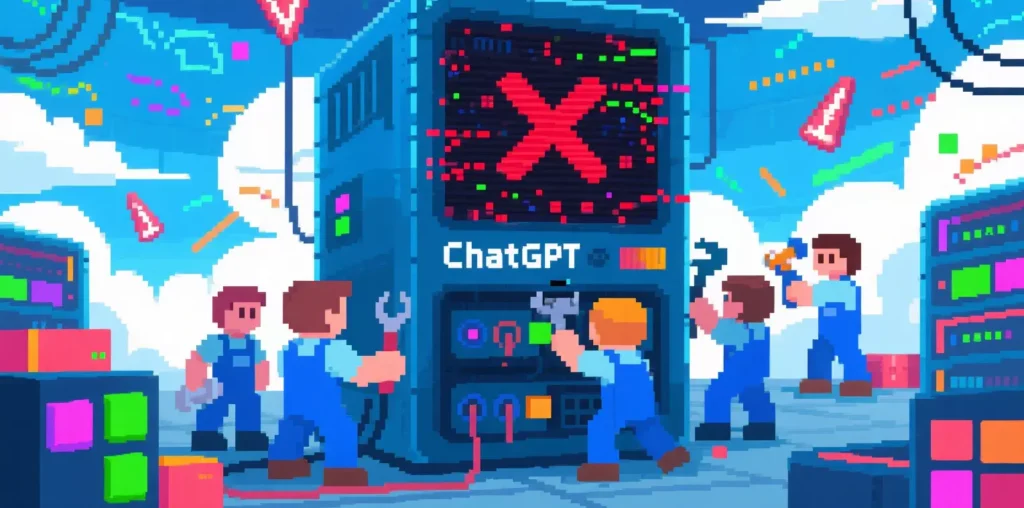On a Tuesday in early June, millions of users around the world experienced a familiar modern-day crisis: ChatGPT was down. The global crash, which lasted for several hours, sent waves of panic and frustration across social media and workplaces, highlighting just how deeply integrated the AI tool has become in our daily lives.
When a service as pivotal as ChatGPT crashes, it’s more than a minor inconvenience; it’s a major disruption to productivity and workflow. Understanding why these outages happen is the first step toward appreciating the complexities of running a global AI service and the importance of stability in the digital tools we rely on.

Why Does a Service Like ChatGPT Crash?
A “ChatGPT crash” isn’t a single event but can be caused by several factors, often working in concert. Based on past outages and statements from OpenAI, here are the most common culprits:
Immense Server Load: ChatGPT serves over 100 million weekly active users. The sheer volume of simultaneous requests can overwhelm even the most robust server infrastructure, leading to slowdowns and crashes. This is often the primary reason for performance issues.
New Feature Rollouts: When OpenAI deploys updates or new features, unforeseen bugs can emerge. These bugs can create system instability that leads to a service-wide outage while engineers work to patch the problem.
DDoS Attacks: Like any high-profile online service, ChatGPT is a target for malicious actors. Distributed Denial-of-Service (DDoS) attacks flood the platform with junk traffic, aiming to overload the servers and make the service unavailable for legitimate users.
Underlying Infrastructure Failures: ChatGPT runs on a massive, complex network of cloud servers. A failure in any part of this underlying hardware or core software can have a cascading effect, resulting in a total service crash.
The Bigger Picture: Preventing Crashes in Your Own Applications
While we as users have no control over OpenAI’s server stability, the recurring “ChatGPT crash” offers a critical lesson for anyone building their own digital tools, services, or businesses: infrastructure reliability is everything.
Whether you are a developer building a web scraper, a marketer running an analytics tool, or a business operating an e-commerce platform, your service’s “uptime” is your promise to your users. A crash or failure in your own application can be just as disruptive to your users as a ChatGPT outage is to you. This is where the quality of your own infrastructure, particularly your use of proxies for data collection or connection management, becomes paramount.

Many application failures stem from unreliable connections. For example, a data scraper might fail because it’s using low-quality, shared IPs that are constantly getting banned, leading to project failure. This is a “crash” on a smaller scale. To avoid this, a professional proxy service like IPFLY provides the foundation needed for stability and high availability.
Here’s how the right infrastructure prevents these kinds of failures:
Guaranteed Uptime: While public services struggle, a professional service guarantees reliability. IPFLY is built on high-performance dedicated servers that ensure 99.9% uptime, providing the stable connection your applications need to run without interruption .
High-Quality, Stable IPs: Unlike low-quality proxies that suffer from “frequent IP failures,” IPFLY provides business-grade Static Residential Proxies with ISP-issued IPs . This ensures your connections are stable, long-lasting, and not associated with abusive activity, preventing blocks and failures.
Handling High Concurrency: Just as ChatGPT deals with massive user loads, your own applications might need to handle many simultaneous requests. IPFLY’s infrastructure is designed for unlimited high-concurrency support, preventing your operations from slowing down or crashing under pressure .
Military-Grade Security: A service crash can also be caused by security breaches.
A secure infrastructure with military-grade encryption ensures your data and connections are protected, preventing unauthorized access that could disrupt your service.

Ultimately, the lesson from every “ChatGPT crash” is that for any service we depend on—or build ourselves—the foundation must be secure, stable, and resilient.


